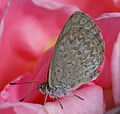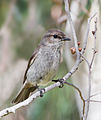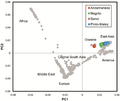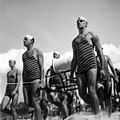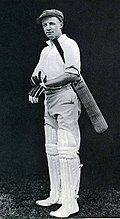Portal:Australia
| Showcase | Content | Interesting facts | Contributing |
Introduction

Australia, officially the Commonwealth of Australia, is a country comprising the mainland of the Australian continent, the island of Tasmania and numerous smaller islands. It has a total area of 7,688,287 km2 (2,968,464 sq mi), making it the sixth-largest country in the world and the largest in Oceania. Australia is the world's flattest and driest inhabited continent. It is a megadiverse country, and its size gives it a wide variety of landscapes and climates including deserts in the interior and tropical rainforests along the coast.
The ancestors of Aboriginal Australians began arriving from south-east Asia 50,000 to 65,000 years ago, during the last glacial period. By the time of British settlement, Aboriginal Australians spoke 250 distinct languages and had one of the oldest living cultures in the world. Australia's written history commenced with Dutch exploration of most of the coastline in the 17th century. British colonisation began in 1788 with the establishment of the penal colony of New South Wales. By the mid-19th century, most of the continent had been explored by European settlers and five additional self-governing British colonies were established, each gaining responsible government by 1890. The colonies federated in 1901, forming the Commonwealth of Australia. This continued a process of increasing autonomy from the United Kingdom, highlighted by the Statute of Westminster Adoption Act 1942, and culminating in the Australia Acts of 1986.
Australia is a federal parliamentary democracy and constitutional monarchy comprising six states and ten territories. Its population of almost 28 million is highly urbanised and heavily concentrated on the eastern seaboard. Canberra is the nation's capital, while its most populous cities are Sydney and Melbourne, both with a population of more than 5 million. Australia's culture is diverse, and the country has one of the highest foreign-born populations in the world. It has a highly developed economy and one of the highest per capita incomes globally. Its abundant natural resources and well-developed international trade relations are crucial to the country's economy. It ranks highly for quality of life, health, education, economic freedom, civil liberties and political rights.
Featured article -
The Australian Air Corps (AAC) was a temporary formation of the Australian military that existed in the period between the disbandment of the Australian Flying Corps (AFC) of World War I and the establishment of the Royal Australian Air Force (RAAF) in March 1921. Raised in January 1920, the AAC was commanded by Major William Anderson, a former AFC pilot. Many of the AAC's members were also from the AFC and would go on to join the RAAF. Although part of the Australian Army, for most of its existence the AAC was overseen by a board of senior officers that included members of the Royal Australian Navy. (Full article...)
Selected biography -
Sidney Charles Bartholemew "Ben" Gascoigne AO (11 November 1915 – 25 March 2010) was a New Zealand-born optical astronomer and expert in photometry who played a leading role in the design and commissioning of Australia's largest optical telescope, the Anglo-Australian Telescope, which for a time was one of the world's most important astronomical facilities. Born in Napier, New Zealand, Gascoigne trained in Auckland and at the University of Bristol, before moving to Australia during World War II to work at the Commonwealth Solar Observatory at Mount Stromlo in Canberra. He became skillful in the design and manufacture of optical devices such as telescope elements. (Full article...)
Did you know (auto-generated) -
- ... that the developers of Hotline Miami 2: Wrong Number suggested that Australian customers pirate their game?
- ... that the Victoria State Government has ordered 100 G-class trams, which is the largest domestic order in Australian history?
- ... that Bill Dunn, an Indigenous Australian pastoralist approaching retirement, sold his station at half-price to the Jigalong community despite receiving full-price offers from non-Indigenous people?
- ... that a dispute over paid sick leave at a chocolate factory ended up before the High Court of Australia in Mondelez v AMWU?
- ... that Lord Stonehaven, Governor-General of Australia, called Hay War Memorial High School the "finest war memorial in the British Empire"?
- ... that when Australian Brihony Dawson debuted as the first non-binary host of reality TV franchise The Challenge, they decided not to imitate the "ominous" style of the U.S. host?
- ... that Episode 8055 of the Australian television soap opera Neighbours is the first episode in the show's history to star and be directed and written entirely by women?
- ... that the Australian government tried to censor a film of Quail Island's starving koalas?
In the news
- 31 March 2025 – Australia–North Korea relations
- The Royal Australian Air Force deploys a long-range maritime patrol aircraft P-8 Poseidon to Kadena Air Base in Okinawa Prefecture, Japan, to monitor North Korean maritime activities in the Yellow Sea, including weapons shipments prohibited under international sanctions. (NK News)
- 8 March 2025 – 2024–25 Australian region cyclone season
- Cyclone Alfred
- One person is confirmed killed and thirteen others are injured in floods caused by Cyclone Alfred as it passes through Queensland and New South Wales, Australia. (AP)
- 5 March 2025 – 2024–25 Australian region cyclone season
- Tropical Cyclone Alfred
- Queensland Premier David Crisafulli announces the suspension of public transport services and the closure of 640 schools in South East Queensland, Australia, as Cyclone Alfred is expected to make landfall early Friday morning local time. (ABC News Australia)
- 3 March 2025 – 2024–25 Australian region cyclone season
- Cyclone warnings are issued to residents of Brisbane, South East Queensland and the Northern Rivers region of New South Wales as Tropical Cyclone Alfred is expected to make landfall on Thursday or early Friday local time. (The Guardian Australia)
Selected pictures -
On this day
- 1787 – Charter of Justice signed providing the authority for the establishment of the first New South Wales Courts of Criminal and Civil Jurisdiction.
- 1844 – The first permanent synagogue in Australia opens in Sydney.
- 1845 – Ludwig Leichhardt discovers and names the Burdekin River.
- 1856 – South Australia introduces the secret ballot.
- 1905 – The Tasmanian General Post Office opens in Hobart, Tasmania.
- 1930 – Isaac Isaacs appointed as the third Chief Justice of Australia.
- 2005 – A Royal Australian Navy Westland Sea King helicopter crashes on the Indonesian island of Nias while providing humanitarian support.
General images
Topics
More portals
WikiProject
 |
 |

| |
Consider joining WikiProject Australia, a WikiProject dedicated to improving Wikipedia's coverage of topics related to Australia. The project page and its subpages contain suggestions on formatting and style of articles, which can be discussed at the project's notice board. To participate, simply add your name to the project members page.
As of 1 April 2025, there are 207,727 articles within the scope of WikiProject Australia, of which 598 are featured and 894 are good articles. This makes up 2.98% of the articles on Wikipedia, 5.28% of all featured articles and lists, and 2.16% of all good articles (see WP:AUSFG). Including non-article pages, such as talk pages, redirects, categories, etc., there are 415,454 pages in the project.
Associated Wikimedia
The following Wikimedia Foundation sister projects provide more on this subject:
-
Commons
Free media repository -
Wikibooks
Free textbooks and manuals -
Wikidata
Free knowledge base -
Wikinews
Free-content news -
Wikiquote
Collection of quotations -
Wikisource
Free-content library -
Wikiversity
Free learning tools -
Wikivoyage
Free travel guide -
Wiktionary
Dictionary and thesaurus






